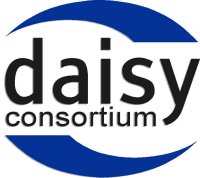| What is a
DAISY Talking Book (DTB): DAISY is a format based on
the W3C defined SGML applications XHTML 1.0 and SMIL 1.0. Using
this framework, a talking book format is presented that enables
navigation within a sequential and hierarchical structure consisting
of (marked-up) text synchronized with audio.
Simple ... right?
Try this instead ...
A traditional talking
book is an analog representation of a print publication. A Digital
Talking Book (DTB) is a multimedia representation of a print
publication. In both instances the rendering of the audio
involves either a human voice or a computer generated voice such
as the ones used in our production technique.
From the FAQ
Page of Dolphin Computer Access:
Q. What is the DAISY format?
A. The Digital Accessible Information SYstem (DAISY) Consortium
was formed in 1996 by talking-book libraries to lead the worldwide
transition from analogue to digital talking-books.
The vision of the DAISY Consortium is "That all published
information is available to people with print disabilities, at the
same time and at no greater cost, in an accessible, feature-rich,
navigable format".
The DAISY format is an international standard for the production,
exchange and use of Digital Talking-Books. The format has been designed
to integrate within mainstream technology to ensure access to information
for people with print disabilities.
The objectives of the DAISY Consortium are:
- To create and promote the worldwide standard for navigation
and structuring of digital talking-books.
- To encourage and foster the establishment and development of
digital talking-book library services in both developed and developing
countries.
- To maximise the accessibility and utility of electronic books
and multimedia documents for people with print disabilities.
- To secure the recognition and adoption of the DAISY standard
for navigable multimedia documents among mainstream product developers
and book publishers.
- To encourage and foster the establishment and development of
a global talking-book library, which transcends geographic boundaries
and linguistic differences, and which embraces cultural diversity.
Q. What is a DAISY Digital Talking
Book?
A. A DAISY Digital Talking Book (DTB) is a multimedia alternative
to a traditional audiocassette based talking book.
- A DTB provides better audio quality it also increases accessibility
by allowing easy navigation from point to point within the content.
- DTB's are played back on either hardware or software players.
Dolphin Audio Publishing produce software players as well as the
authoring solutions for either converting analog talking books
into the DAISY format or creating new DAISY books by recording
digitally.
- DTB's produced to the DAISY standard are independent of distribution
media types. This means that a book that is distributed on CD
may also be distributed on any other form of storage device -
available now or in the future.
- A DAISY DTB can also include text and images which are synchronized
with the audio.
In total, there are six (6) types of DAISY books defined by the
DAISY Consortium:
- Full audio with title element only - This is a DTB without navigation
structure. Only the title of the book is displayed as text. The
actual content is presented as linear audio only. Direct access
to points within the DTB is not possible.
- Full audio with Navigational Control Center (NCC) only - This
is a DTB with structure. That provides both sequential and hierarchical
navigation. In many cases, the structure in this type of DTB resembles
the table of contents of its print source.
- Full audio with NCC and partial text - This is a DTB with structure
as described above, as well as some additional text which is synchronized
with the audio. The additional text components may be present
where keyword searching or direct access to the text is required.
- Full text and audio - This is a DTB with structure and
synchronized text and audio. [in general, this is what we build
at Boston University]
- Full text and some audio - This is a DTB with structure, complete
text and partial audio. This type of DTB could be used as a dictionary
where only pronunciations were provided in audio form. The audio
and text are synchronized.
- Text and no audio - This is a DTB containing an NCC and marked
up/structured electronic text only. No audio is present. This
file may be used for Braille output.
 |
At
a very early point in the development of the DAISY standard,
talking book readers from many countries were consulted regarding
their reading requirements and their vision of a fully accessible
audio book. Those who provided input made it very clear that
analog recordings did not meet their reading and information
needs. Access to points within the books, awkwardness of the
medium itself, sound quality plus numerous other issues indicated
that producers of talking books had to begin the move to a digital
platform. However, a digitally produced human voice talking
book in itself would not resolve all of the issues, particularly
the issues of accessibility and navigation from point to point
within the book. DAISY DTBs do meet talking book reader requirements
by providing access to the talking book that has never before
been possible with a human voice production of a print book.
- [from the DAISY Consortium] |
For more information,
visit the following sites:
|

